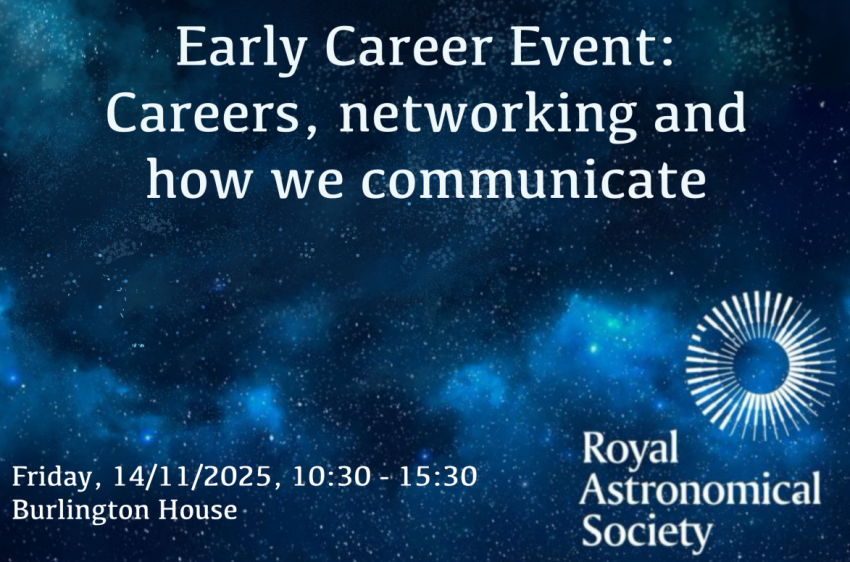Click here to get your Fellow Ticket
Click here to get your Non-Fellow Ticket
Event summary:
This event is catered towards early career researchers. We will explore different career pathways both within and beyond academia, discuss the importance of effective communication for sharing our research and provide a platform to make professional connections and build a supportive community within the UK. There will be a careers panel and a discussion on science communication, as well as some time for networking.
Event timetable:
10:30 – 10:45: Welcome and introduction
10:45 – 12:30: Career panel
12:30 – 14:00: Lunch (Hang around in the library for an informal social networking session)
14:00 – 15:30: Science communication session
Career Panel:
Dr. Paola Pinilla (Associate Professor, MSSL)
Dr. Paola Pinilla is an associate professor at the Mullard Space Science Laboratory of UCL. She studied her BSc and MSc in her country of origin, Colombia. She did a PhD at Heidelberg University in Germany and hold several positions before joining UCL, including: a post-doctoral researcher at Leiden Observatory, a NASA Hubble Fellowship at University of Arizona, and an independent group leader at the Max Planck Institute for Astronomy. Her research interests focus on understanding the first steps of planet formation using theoretical models and observations of young stars. Paola also enjoys working on topics related to equity, diversity, and inclusion. She was recently awarded an ERC starting grant, the 2024 New Horizons in Physics Prize, and the 2025 Royal Astronomical Society Price Medal.
Dr. Robert Shore (Data scientist, Cambridge)
Rob Shore’s career to date has spanned an undergrad in Geophysics (with Physics) at the University of Liverpool, 2 years working for an oil & gas consultancy in Leeds, a PhD in geomagnetism at the University of Edinburgh, followed by 3 postdocs in space physics at the British Antarctic Survey. In 2022, he joined Cambridge University Press & Assessment’s Data Science Unit, to work on educational assessment. His current role is Principal Data Scientist in a team of 17, where he provides technical leadership in applied AI research. When not working, Rob can be found either cycling or gardening.
Prof. Chris Jackson (Technical Director, WSP; Visiting Professor, Imperial)
Chris Jackson is Technical Director at the engineering consultancy WSP and Visiting Professor of Basin Analysis at Imperial College London. Chris is interested in understanding how we can use the Earth’s subsurface to safely store hazardous waste (‘geostorage’) and to develop low-carbon energy resources (‘geoenergy’). When not studying the subsurface of the Earth, Chris gives geoscience lectures to the public and in schools, having appeared on several, Earth Science-focused, television productions and podcasts. Chris is engaged in efforts to improve equality, diversity, and inclusivity within science and engineering.
Dr. David Boyce (Teacher, Queenswood school)
Dr. David Boyce is one of the most influential science educators in the world, celebrated for his innovative teaching of physics, chemistry, and astronomy at the secondary school level. With an MPhys from Lancaster University and a PhD from the University of Leicester, he transitioned from research to education and is chartered in five different disciplines while holding six prestigious fellowships. A fully qualified mountaineer, he integrates practical astronomy into curricula at schools like Queenswood, while his influential YouTube channel and X presence provide extensive GCSE and A-level resources. Honored with the 2023 Royal Astronomical Society Secondary Education Award, Boyce’s dedication to hands-on learning, authorship of physics textbooks, and advocacy for inclusive education inspires students and educators globally.
Dr. Karen Lythgoe (Independent Research Fellow, University of Edinburgh)
Karen is a NERC Independent Research Fellow at the School of GeoSciences, University of Edinburgh. Her research in geophysics has spanned a range of scales in the Earth, from the inner core to the near-surface. She obtained her PhD from the University of Cambridge in deep Earth geophysics, before joining BP as a research geophysicist in shallow seismic imaging. Karen then moved into natural hazards research, joining a research institute in Singapore (the Earth Observatory of Singapore) as an Independent Research Fellow. Her experiences have given her insights into academic/industry career switches and lateral career changes.
Dr. Affelia Wibisono (Public Engagement Officer, IOP)
Affelia Wibisono is the Public Engagement Officer at the Institute of Physics, bringing 15 years of science communication experience to the role. They have a proven record of engaging the public with science, through work with institutions such as the Science Museum, the Royal Institution, the Royal Observatory Greenwich, and the BBC. Affelia also performs at science festivals, contributes to published books through writing and consulting, and frequently appears in the media to discuss current astronomy news. Affelia completed their PhD in Planetary Science at the Mullard Space Science Laboratory (MSSL), UCL in 2023, and have since held a postdoctoral position at the Dublin Institute for Advanced Studies (DIAS).
Dr. James O’Donoghue (Planetary Scientist, University of Reading)
James O’Donoghue is a planetary astronomer at the University of Reading who researches Jupiter and Saturn's upper atmospheres, aurorae, and rings. After earning his PhD at Leicester, he worked at NASA, Boston University, and the Japanese space agency, JAXA, over several years. He also creates outreach animations that have been viewed hundreds of millions of times, amassing nearly 250,000 followers on social media in the process. These educational videos have been used in classrooms, museums, and planetariums worldwide, and earned him the 2021 Europlanet Society Prize for Public Engagement.
Jessica Lee (Astronomy Education Officer, Royal Museums Greenwich)
As an astronomer at the Royal Observatory, Jess creates, updates and delivers content communicating astronomy to school students. This includes workshops, science theatre shows, animated videos, podcasts and blogs, planetarium shows, outreach projects, youth groups, and publications. She also advocates for accessible astronomy content across the department and beyond.


